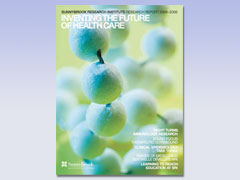Going Against the Grain
In theory, giving carbon dioxide (CO2) to a baby with persistent pulmonary hypertension is an absurd notion. Studies in the 1960s and 1970s showed that, if you make the blood alkaline (i.e., increase the pH), the vessels in the lung open. If you make the blood acidic (i.e., decrease the pH), they tighten. Historically, then, doctors have worked to alkalinize the blood to treat this condition by decreasing its exposure to CO2. But the evidence supporting this approach, says Robert Jankov, a neonatologist and scientist at Sunnybrook Research Institute is, "not that strong. It's really just become part of dogma.
"I'm challenging that."
Pulmonary hypertension is a common condition in newborns that results in response to the abrupt transition from womb to outside world. When a baby is born and necessarily cut off from her oxygen supply, her lungs must spring into action, and blood vessels must open to ease the entry of oxygen into the blood. In most cases, they do. For infants with this condition, they don't.
What's more, if a baby is suffering severely, her blood vessels will change their structure, going from thin-walled and flexible to a state that more closely resembles a corroded lead pipe. Along with it, her condition degrades from being possibly reversible to irreversible and potentially progressive. Jankov is concerned with understanding what makes the blood vessel "remodeling" occur so that it can be prevented or reversed.
New evidence—done on preclinical models in isolated vessel preparations—showed that injecting CO2 into a blood vessel will automatically stimulate dilation. Carbon dioxide, it suddenly appeared, has two opposing consequences: it increases the acidity of the blood in the milieu, and it also chemically inspires dilation.
In an article published in 2006 in the American Journal of Physiology, Jankov not only showed that increased amounts of CO2 would limit the development of chronic pulmonary hypertension, he confirmed that CO2's beneficial effect is tied to its power to limit oxidant stress. Finally, his research found a link between free radicals and the production of endothelin, a molecule that constricts blood vessels and contributes to remodeling. If you decrease the free radicals content, he showed, you will reduce endothelin production in the lungs.
"This is completely opposite to what we would normally do," Jankov says. "This suggests for the first time that, in the newborn, chronic exposure to CO2 has beneficial effects." The advantages of CO2 are considerable: principally, that it's cheap and easy to give.
There's still a lot to be done. But in the meantime, says Jankov, "It's nice to come up with something that might create a new paradigm."
Jankov's work is funded by the Canada Foundation for Innovation, Canadian Institutes of Health Research, Ontario Innovation Trust and Ontario Thoracic Society.
PDF / View full media release »





